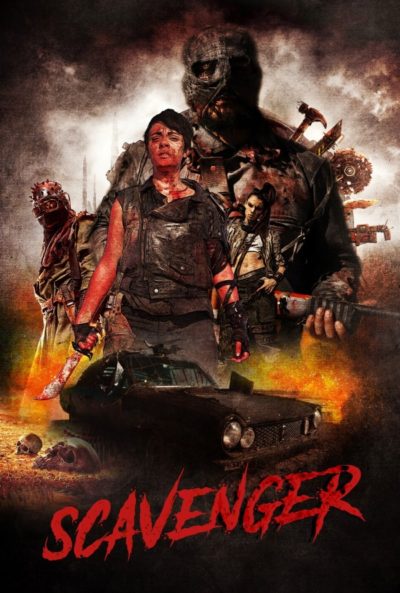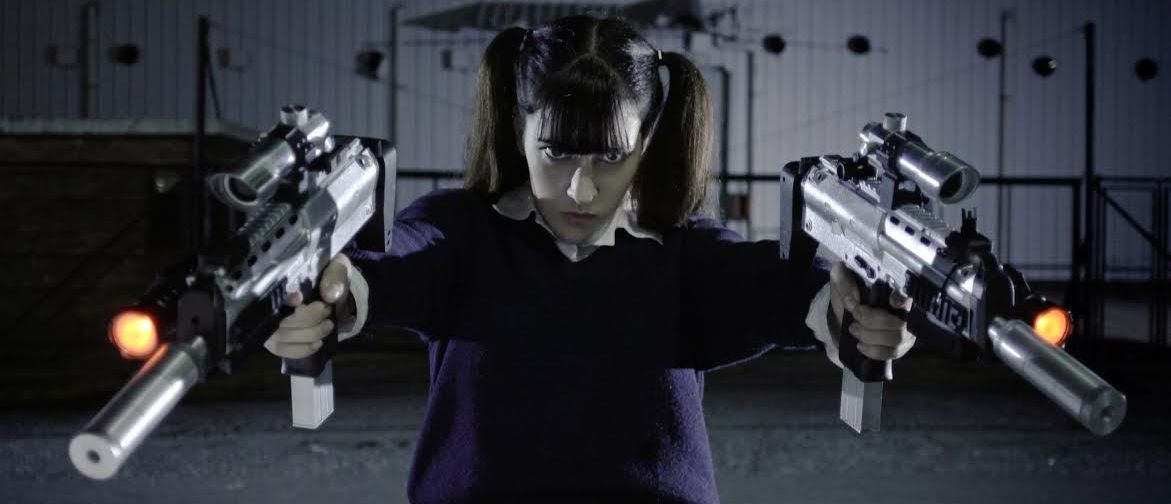★½
“Not even worth it as scrap.”
 This should be right up my alley. For it’s a grungy, post-apocalyptic story of revenge, which is heavy both on the carnage and the nudity. Throw in disapproving reviews containing lines like, “Downright nasty movie that takes all the worst bits of exploitation cinema and proudly puts it on display,” or “Scavenger is truly appalling,” and you’ll understand why it was fast-tracked for viewing. However, the weird thing is… those reviews aren’t wrong – it is a bad movie, just not for the reasons they espouse. The bigger problem is simply poor execution, in a way that manages to take the sex ‘n’ violence, and make it all painfully dull. Of all the cinematic sins, that’s one I find hard to forgive.
This should be right up my alley. For it’s a grungy, post-apocalyptic story of revenge, which is heavy both on the carnage and the nudity. Throw in disapproving reviews containing lines like, “Downright nasty movie that takes all the worst bits of exploitation cinema and proudly puts it on display,” or “Scavenger is truly appalling,” and you’ll understand why it was fast-tracked for viewing. However, the weird thing is… those reviews aren’t wrong – it is a bad movie, just not for the reasons they espouse. The bigger problem is simply poor execution, in a way that manages to take the sex ‘n’ violence, and make it all painfully dull. Of all the cinematic sins, that’s one I find hard to forgive.
It takes place some years after a non-specific apocalypse, which has left cannibalism as the sole source of meat. Muscle cars, lingerie and cassette tapes are, apparently, still plentiful. Roaming this wilderness is Tisha (Churruarin), part bounty-hunter, part nomadic butcher. She accepts a commission from an old woman, to hunt down the scumbags who made her a whore and ruined her life – the usual. Tisha accepts, even waiving her normal fee. However, on arrival at the house of ill repute run by Luna (Lanaro), she quickly finds herself on the staff. She’s going to need to find a way out before she can complete her mission. It’s also going to get considerably more personal before all is said and done.
I suspect the above sounds more fun than it really is. Part of this may be the dubbing, which appears to be both written and performed by people for whom English is a very distant second language at best. However, the main issue is simply far too many periods when zero of interest happens. Basically, after Tisha arrives at Luna’s, absolutely nothing of importance happens for a good half hour. Unless you consider the heroine being subjected to various indignities, up to and including being peed on, as “important”. In a film which runs only 71 minutes including credits, it’s a criminal waste of time, and the film has little or no chance to recover thereafter.
Its death nerve twitches feebly down the stretch, with some enthusiastic gore, Tisha wielding a bizarre weapon like a giant mixer to disembowel people. Yet it could do no more than provoke a slightly raised eyebrow. There are a couple of elements I did like: the heroine is not your typical post-apocalyptic babe; Churruarin has a rough edge to her presence that works in this setting. Generally, the set design is good too, selling the scenario effectively. These both need to be in the service of a considerably better script – one apparently less dedicated to enacting the bizarre sexual domination fetishes of the film-makers, which I do not share. ‘Truly appalling”? I probably wouldn’t give it that much credit, to be frank.
Dir: Eric Fleitas, Luciana Garraza
Star: Nayla Churruarin, Eric Fleitas, Sofia Lanaro, Jose Manuel Solis Vargas
a.k.a. Carroña





 This begins, literally, with a bang. We first meet the heavily pregnant Maria (Docampo), carrying a rifle and preparing to leave her house. A man rises from the floor, and after a struggle for the gun, it goes off, and he drops back down. She hits the road in their pick-up truck, fearful of what she had done, and intending to head back to Naicó, the town where she was born. However, it’s not long before the people she meets on the road, seek to dissuade her from going there. It seems like everyone has a weird story about why her destination is not a good idea, from mysterious lights that abduct you, to a cult of blond people with possible Nazi connections.
This begins, literally, with a bang. We first meet the heavily pregnant Maria (Docampo), carrying a rifle and preparing to leave her house. A man rises from the floor, and after a struggle for the gun, it goes off, and he drops back down. She hits the road in their pick-up truck, fearful of what she had done, and intending to head back to Naicó, the town where she was born. However, it’s not long before the people she meets on the road, seek to dissuade her from going there. It seems like everyone has a weird story about why her destination is not a good idea, from mysterious lights that abduct you, to a cult of blond people with possible Nazi connections. Turns out, interesting is not the same as good or entertaining. Who knew? If you watch this unaware, as I did, you are certainly going to be very,
Turns out, interesting is not the same as good or entertaining. Who knew? If you watch this unaware, as I did, you are certainly going to be very,  The film begins with an Argentinian school-trip to a volcanic area, which goes badly wrong when one of the schoolgirls, Cornelia, vanishes. Despite an extensive search, all that’s found is her locket. 14 years later, the missing girl’s best friend, Pipa (Lopilato), is now a cop, channeling the guilt she still feels about Cornelia’s disappearance and her role in it, into work. After a mass to mark the anniversary of the incident, Cornelia’s mother visits Pipa, begging her to re-open the case. Despite initial qualms, she does so, only to find a restaurant-sized can of worms comes along with it. Pipa finds herself facing a serious criminal organization, under the control of a woman known as The Mermaid (Salamanca), whose tentacles stretch both around the world and into the past.
The film begins with an Argentinian school-trip to a volcanic area, which goes badly wrong when one of the schoolgirls, Cornelia, vanishes. Despite an extensive search, all that’s found is her locket. 14 years later, the missing girl’s best friend, Pipa (Lopilato), is now a cop, channeling the guilt she still feels about Cornelia’s disappearance and her role in it, into work. After a mass to mark the anniversary of the incident, Cornelia’s mother visits Pipa, begging her to re-open the case. Despite initial qualms, she does so, only to find a restaurant-sized can of worms comes along with it. Pipa finds herself facing a serious criminal organization, under the control of a woman known as The Mermaid (Salamanca), whose tentacles stretch both around the world and into the past. This crisp little Argentinian film clocks in at 70 minutes – not even enough to be considered a feature by the Screen Actors Guild. You’ll understand, therefore, there isn’t much fat on its bones. Virginia (Cardinali) has left her husband, taking daughter, Rebecca (Duranda), with her. But a moment’s inattention at a gas-station proves fatal, as Rebecca is abducted, and Virginia’s car driven off the road during the subsequent pursuit. Brought back (from the dead?) by a mysterious stranger (Ferro), she is told Rebecca has been chosen by a religious cult as a sacrifice. It’s up to Virginia to stop them, and she can let no-one get in her way. Which becomes an issue, for we quickly find out, she is not the only mother looking to recover a child from the cult – and, it appears, only one can succeed.
This crisp little Argentinian film clocks in at 70 minutes – not even enough to be considered a feature by the Screen Actors Guild. You’ll understand, therefore, there isn’t much fat on its bones. Virginia (Cardinali) has left her husband, taking daughter, Rebecca (Duranda), with her. But a moment’s inattention at a gas-station proves fatal, as Rebecca is abducted, and Virginia’s car driven off the road during the subsequent pursuit. Brought back (from the dead?) by a mysterious stranger (Ferro), she is told Rebecca has been chosen by a religious cult as a sacrifice. It’s up to Virginia to stop them, and she can let no-one get in her way. Which becomes an issue, for we quickly find out, she is not the only mother looking to recover a child from the cult – and, it appears, only one can succeed.

 I have no problem with rape/revenge movies, providing the balance is skewed more towards the revenge than the rape. Ms. 45, for example, has about five minutes of rape and 60 of revenge. This is fine by me. I am all about the revenge, which should be nasty and brutal, exactly what sexual predators deserve. Actually, so should the rape be, because portraying it any other way is very, very questionable. But that’s something which hardly needs depicting: I’m quite happy taking it as read, thank you very much. Here, the depicted brutalization of four young women goes on far longer than necessary to serve any
I have no problem with rape/revenge movies, providing the balance is skewed more towards the revenge than the rape. Ms. 45, for example, has about five minutes of rape and 60 of revenge. This is fine by me. I am all about the revenge, which should be nasty and brutal, exactly what sexual predators deserve. Actually, so should the rape be, because portraying it any other way is very, very questionable. But that’s something which hardly needs depicting: I’m quite happy taking it as read, thank you very much. Here, the depicted brutalization of four young women goes on far longer than necessary to serve any  It’s amusing to see that even New Concorde – who released it – don’t seem to have watched the film, their website describing it as “about the legendary lost tribe of warrior women”. Er, no: the A word doesn’t actually get used in the movie, which is really about the quest for a legendary sword, the only thing which stands between an evil sorcerer and world domination.
It’s amusing to see that even New Concorde – who released it – don’t seem to have watched the film, their website describing it as “about the legendary lost tribe of warrior women”. Er, no: the A word doesn’t actually get used in the movie, which is really about the quest for a legendary sword, the only thing which stands between an evil sorcerer and world domination. Much like the first, bondage fans would probably mark this a grade, possibly one and a half, higher given the amazing length of time the heroine spends tied to racks and other torture devices – or just tied in general. Not that this, per se, makes it a bad movie. No, the severely limited budget (the population of the land where this takes place appears to be about 1/10th that of San Marino) and clunky acting take care of that…
Much like the first, bondage fans would probably mark this a grade, possibly one and a half, higher given the amazing length of time the heroine spends tied to racks and other torture devices – or just tied in general. Not that this, per se, makes it a bad movie. No, the severely limited budget (the population of the land where this takes place appears to be about 1/10th that of San Marino) and clunky acting take care of that… One interesting subplot is Ankaris’s daughter (Tijerina), a genuinely creepy teen with a disturbing interest in methods of torture. She has a crush on Amathea’s love interest and evokes the spirit of her dead mother to help her out. This angle adds a welcome depth, to a story that otherwise is largely what you would expect. The fighting is largely woeful: one participant holds their sword up while the other bangs their weapon off it. Yet, it’s never dull and Clarkson makes a good heroine, independent and feisty from the opening scene.
One interesting subplot is Ankaris’s daughter (Tijerina), a genuinely creepy teen with a disturbing interest in methods of torture. She has a crush on Amathea’s love interest and evokes the spirit of her dead mother to help her out. This angle adds a welcome depth, to a story that otherwise is largely what you would expect. The fighting is largely woeful: one participant holds their sword up while the other bangs their weapon off it. Yet, it’s never dull and Clarkson makes a good heroine, independent and feisty from the opening scene.